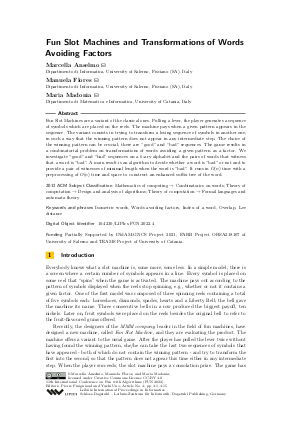Fun Slot Machines and Transformations of Words Avoiding Factors
Authors Marcella Anselmo, Manuela Flores, Maria Madonia
-
Part of:
Volume:
11th International Conference on Fun with Algorithms (FUN 2022)
Part of: Series: Leibniz International Proceedings in Informatics (LIPIcs)
Part of: Conference: International Conference on Fun with Algorithms (FUN) - License:
 Creative Commons Attribution 4.0 International license
Creative Commons Attribution 4.0 International license
- Publication Date: 2022-05-23
File

PDF
LIPIcs.FUN.2022.4.pdf
- Filesize: 0.74 MB
- 15 pages
Document Identifiers
Subject Classification
ACM Subject Classification
- Mathematics of computing → Combinatorics on words
- Theory of computation → Design and analysis of algorithms
- Theory of computation → Formal languages and automata theory
Keywords
- Isometric words
- Words avoiding factors
- Index of a word
- Overlap
- Lee distance
Metrics
- Access Statistics
-
Total Accesses (updated on a weekly basis)
0Document
0Metadata
Abstract
Fun Slot Machines are a variant of the classical ones. Pulling a lever, the player generates a sequence of symbols which are placed on the reels. The machine pays when a given pattern appears in the sequence. The variant consists in trying to transform a losing sequence of symbols in another one, in such a way that the winning pattern does not appear in any intermediate step. The choice of the winning pattern can be crucial; there are "good" and "bad" sequences. The game results in a combinatorial problem on transformations of words avoiding a given pattern as a factor. We investigate "good" and "bad" sequences on a k-ary alphabet and the pairs of words that witness that a word is "bad". A main result is an algorithm to decide whether a word is "bad" or not and to provide a pair of witnesses of minimal length when the word is "bad". It runs in O(n) time with a preprocessing of O(n) time and space to construct an enhanced suffix tree of the word.
Cite As Get BibTex
Marcella Anselmo, Manuela Flores, and Maria Madonia. Fun Slot Machines and Transformations of Words Avoiding Factors. In 11th International Conference on Fun with Algorithms (FUN 2022). Leibniz International Proceedings in Informatics (LIPIcs), Volume 226, pp. 4:1-4:15, Schloss Dagstuhl – Leibniz-Zentrum für Informatik (2022)
https://doi.org/10.4230/LIPIcs.FUN.2022.4
BibTex
@InProceedings{anselmo_et_al:LIPIcs.FUN.2022.4,
author = {Anselmo, Marcella and Flores, Manuela and Madonia, Maria},
title = {{Fun Slot Machines and Transformations of Words Avoiding Factors}},
booktitle = {11th International Conference on Fun with Algorithms (FUN 2022)},
pages = {4:1--4:15},
series = {Leibniz International Proceedings in Informatics (LIPIcs)},
ISBN = {978-3-95977-232-7},
ISSN = {1868-8969},
year = {2022},
volume = {226},
editor = {Fraigniaud, Pierre and Uno, Yushi},
publisher = {Schloss Dagstuhl -- Leibniz-Zentrum f{\"u}r Informatik},
address = {Dagstuhl, Germany},
URL = {https://drops.dagstuhl.de/entities/document/10.4230/LIPIcs.FUN.2022.4},
URN = {urn:nbn:de:0030-drops-159743},
doi = {10.4230/LIPIcs.FUN.2022.4},
annote = {Keywords: Isometric words, Words avoiding factors, Index of a word, Overlap, Lee distance}
}
Author Details
Funding
Partially Supported by INdAM-GNCS Project 2021, FARB Project ORSA218107 of University of Salerno and TEAMS Project of University of Catania.
References
- Marcella Anselmo, Manuela Flores, and Maria Madonia. On k-ary n-cubes and isometric words. Preprint, 2021. URL: https://docenti.unisa.it/uploads/rescue/385/8179/afm-k-aryisometricwords.pdf.
-
Marcella Anselmo, Manuela Flores, and Maria Madonia. Quaternary n-cubes and isometric words. In Thierry Lecroq and Svetlana Puzynina, editors, Combinatorics on Words, pages 27-39, Cham, 2021. Springer International Publishing.

- Marcella Anselmo, Dora Giammarresi, Maria Madonia, and Carla Selmi. Bad pictures: Some structural properties related to overlaps. In Galina Jirásková and Giovanni Pighizzini, editors, DCFS 2020, volume 12442 of Lect. Notes Comput. Sci., pages 13-25. Springer, 2020. URL: https://doi.org/10.1007/978-3-030-62536-8_2.
-
Marie-Pierre Béal and Maxime Crochemore. Checking whether a word is hamming-isometric in linear time. arXiv preprint arXiv:2106.10541, 2021.

-
Zvi Galil and Raffaele Giancarlo. Improved string matching with k mismatches. ACM SIGACT News, 17(4):52-54, 1986.

- Frank Harary, John P. Hayes, and Horng-Jyh Wu. A survey of the theory of hypercube graphs. Computers & Mathematics with Applications, 15(4):277-289, 1988. URL: https://doi.org/10.1016/0898-1221(88)90213-1.
- W. . Hsu. Fibonacci cubes-a new interconnection topology. IEEE Transactions on Parallel and Distributed Systems, 4(1):3-12, 1993. URL: https://doi.org/10.1109/71.205649.
- Aleksandar Ilić, Sandi Klavžar, and Yoomi Rho. Generalized fibonacci cubes. Discrete Mathematics, 312(1):2-11, 2012. URL: https://doi.org/10.1016/j.disc.2011.02.015.
- Sandi Klavžar. Structure of fibonacci cubes: A survey. Journal of Combinatorial Optimization, 25, May 2013. URL: https://doi.org/10.1007/s10878-011-9433-z.
-
Sandi Klavžar and Sergey V. Shpectorov. Asymptotic number of isometric generalized Fibonacci cubes. Eur. J. Comb., 33(2):220-226, 2012.

-
Gad M. Landau and Uzi Vishkin. Efficient string matching in the presence of errors. In 26th Annual Symposium on Foundations of Computer Science, pages 126-136. IEEE, 1985.

- Weizhen Mao and David M. Nicol. On k-ary n-cubes: theory and applications. Discrete Applied Mathematics, 129(1):171-193, 2003. URL: https://doi.org/10.1016/S0166-218X(02)00238-X.
-
Jianxin Wei. The structures of bad words. Eur. J. Comb., 59:204-214, 2017.

